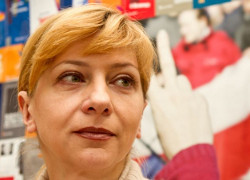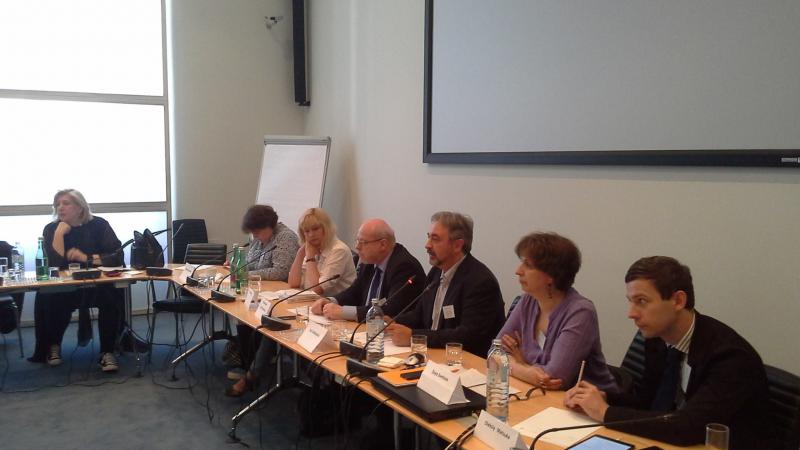Iryna Khalip: “It is impossible to fight for freedom of speech alone”
- 7.07.2014, 12:30
- 2,167

As long as the Lukashenka regime exists, it is pointless to speak of the freedom of speech separately.
On 3-4 June in Vienna an extra session of the OSCE on human dimension took place, which discussed the freedom of expression and was organized by the OSCE ODIHR and OSCE office for media freedom.
At the OSCE plenary session the speakers spoke on states commitments to ensure the freedom of expression, accepted, among all, in the framework of international agreements, the OSCE and civil society’s roles in fighting for the freedom of expression. Keynote speakers were the new director of the OSCE ODIHR Michael George Link, UN High Commissioner for Human Rights Navanethem Pillay, the chairman of the OSCE council Thomas Greminger and others. A journalist of the Russian Novaya Gazeta and former Belarusian political prisoner Iryna Khalip spoke at the plenary session of the problem of blocking of independent web-sites in Belarus, including the charter97.org web-site: if earlier the web-site was blocked for access only at state institutions, then now mobile providers and sub-providers have joined the campaign against independent information.
An entry was made in the session’s protocol with a recommendation to the OSCE representative for the freedom of media to make an assessment of the laws, related to internet regulations, adopted in the participant countries and promptly react to the cases of unjustified blocking of web-sites.
In the framework of the OSCE conference a special session took place on the topic of threats to journalists, who write on human rights violations and tortures in Belarus, Russia, Azerbaijan and Ukraine. It was organized by the Civic Solidarity platform, in particular, its representatives, human rights activists Yury Dzhibladze and Olga Zakharova.

At the session journalist from these four countries spoke: a reporter for the Novaya Gazeta in Belarus Iryna Khalip, a journalist of the Azerbaijani Radio Free Europe service Khadija Ismayilova, an observer of the Russian The New Times weekly Zoya Svetova and a HromadskeTV journalist Oleksiy Matsuka from Donetsk. Also took part the OSCE representative for the freedom of media Dunja Mijatovic, and adviser to the Minister of Foreign Affairs of Sweden ambassador Olof Erenkrona and OSCE countries delegation members.
“Journalists, who write about tortures and other human rights violations, face the threat of physical violence for their job in many OSCE countries, - the event’s organizers said. – They experience increasingly hard pressure and harassment on the part of the state, are unlawfully kept in prisons, get found guilty on unjust and politically motivated trials, they get intimidated, they fall victims to attacks and even murders. Many governments do not adopt effective legislative measures, in order to protect journalists, investigate the cases of attacks on them and threats to their address, hold the guilty responsible. Often governments deny the very existence of the problem and refuse to cooperate within the OSCE framework in order to maintain the commitments already taken in this area”.
- The government of our states, which are OSCE members, simply cannot deny the existence of the problem, since they are the ones creating it, - Iryna Khalip said in an interview to the charter97.org. – I hope, everyone understands it. It is only that, in my view, it is mistaken – and I mentioned that in my speech - to single out one problem and try to solve it under a dictatorship. Howe can we be speaking of the freedom of speech under a dictatorship. As long as the Lukashenka regime exists, it is pointless to speak of the freedom of speech separately, of the release of political prisoners separately, of torture prevention in prisons separately and separately of investigations of abduction cases. While the dictatorship lives, not a single problem will be solved separately from the others.
- Did you share your personal experience in the speech?
- Of course, I told in detail about everything that we experienced in prisons, - not only about the experience of our family, but also about what Natalia Radzina, Dzmitry Bandarenka, other political prisoners faced. I spoke of Aleh Biabienin, who received death threats back in 1997, when he was the first of Belarusian journalist and activists, taken into the woods. In 13 years after that abduction he died, so every threat should be taken seriously. And reaction to threats should be tough, without waiting until a murder or an arrest takes place.









